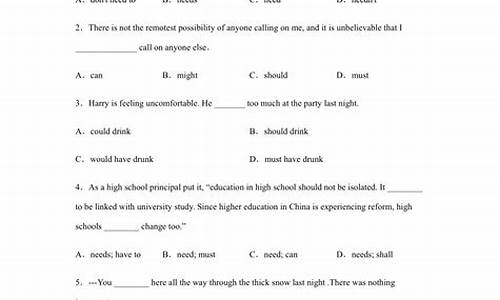您现在的位置是: 首页 > 高考调剂 高考调剂
情态动词高考题,情态动词历年高考真题
tamoadmin 2024-05-18 人已围观
简介1.高考英语语法:2010年高考英语语法精讲二十六 情态动词too soon太早 太快 so soon这么快much soon也很快very soon很快, 立刻, 马上if it is the best thing to do,it cannot be done too soon如果这是最好的事,它不能做的太快以上是我查找的翻译 我怀疑题目本身有问题 翻译读起来怪怪的。高考英语语法:2010年高
1.高考英语语法:2010年高考英语语法精讲二十六 情态动词

too soon太早 太快
so soon这么快
much soon也很快
very soon很快, 立刻, 马上
if it is the best thing to do,it cannot be done too soon
如果这是最好的事,它不能做的太快
以上是我查找的翻译 我怀疑题目本身有问题 翻译读起来怪怪的。
高考英语语法:2010年高考英语语法精讲二十六 情态动词
The little girl__________to the forest .
A?didn't?dare?goB?dared?not?to?go?C?dared?not?go?D?dares?to?go.
我觉得四个选项都对……T?T
答:不是四项都对,但确实有争议。
析:本题考dare这个动词的两种不同用法。
作情态动词,它和can类情态动词一样,后跟动词原形,否定直接加not后再跟动词原形。疑问句直接将它提到主语的前面,多用于否定句和疑问句(以及条件状语从句中):
He ~ not tell us.
他不敢告诉我们
D~ he fight?.
他敢打架 [打仗] 吗?
How ~ you [he] say such a thing?.
你[他]怎麼敢说这样的话?
They ~d not look me in the face.
他们不敢直视我的脸
If he ~ say such a thing again, I shall knock him down.
如果他胆敢再说这种话,我一定把他打倒在地
2. 作实义动词,可参考want的用法,后跟不定式作宾语dare to do sth. 否定和疑问需要借助于助动词完成:
1 敢…,胆敢
He does not ~ to tell us.
他不敢告诉我们
Do you ~ to ask her?.
你敢问她吗?
I have never ~d (to) speak to him.
我从不敢和他说话
I wonder how she ~s (to) say that.
我奇怪她怎麼敢那样说
Don't you ~ (to) touch me.
你敢碰我?
但注意到上面三个省略to的情况,这个和need不一样(need也是一个兼类动词)
The little girl__________to the forest .
A didn't dare go ? B dared not to go ?C dared not go D dares to go.
析:据上面的词典的例句,B是错的,因为从not放dared后可知道,说话者将dare作情态动词看待了,而情态动词后面是跟无to不定式的。
C是正确的,而且是“参考答案”。如上所说,这里的dare作情态动词用,后直接跟not构成否定。再跟动词原形。
译:这小女孩(过去)不敢去那片森林。
但出题者没有想到的是,A和D也是正确的句子。
A。显然是将dare作实义动词看特了,因为它用了助动词didn't, 所以照理后跟有to不定式作其宾语,但我们在词典中发现,这种情况下,这个to可以省略!!!命题者没有查过词典,不知道,所以认为A不对。考生要知道考官的心理及知识水平,建议考试时,不要选择A
而答案D,显然是当它作实义动词用了,只不过是一般现在时,表示这女孩胆子大,改进那片森林,第三人称作主语,谓语动词dare也加了s,后面也跟了to do sth. 没有上文规定说这个一定得用否定句,所以D也是对的:
译:D。这个小女孩敢去那片森林。
评:这是一失误题,不会出现在中考,更不会出现在高考中。“正确”答案是C
《2010年高考英语语法精讲二十六 情态动词》由留学英语组我整理(www.liuxue86.com)。本内容整理时间为05月12日,如有任何问题请联系我们。
1、情态动词 + have done sth
这个结构有着特殊意义:用来表示猜测(设想可能发生过什么事情)或
想象(设想可能出现过什么不同的情况)
①should (ought to) have done sth 本来该做而未做
This wall oughtn?t to have been painted blue.
②need have done sth 本来有必要做而未做
You needn?t have told her the news.
③must have done sth 对过去所做动作的肯定推测
---We went to Paris.
---That must have been nice.
④can have done sth 对过去所做动作的否定或疑问推测
I don?t think he can have heard you. Call again.
Where can John have put the matches?
⑤may (might) have done sth 过去可能发生某事,与could相比,may和 might可能性较小,might 可能性更小;might 也可表示过去可能发生而未发生的事情。
Polly?s very late----she may (might) have missed her etrain.
You were stupid to try climbing there. You might have killed youself
⑥could have done sth
推测过去?可能?发生某事 (同can, 但can不用肯定句)
She could have gone off with some friends.
表示过去没有实现的可能性:某事可能发生,但却没有发生
You were stupid to go skiing there----you could have broken your leg.
表示有能力做而未做(虚拟语气)
You could have helped me !
(You were able to help me, but you didn?t.)
2、can could be able to 表示?能力?
can 通常表示现在的或?一般的能力?---即你无论什么时候想做就能
做到的能力, 指单纯的表示一个人有某种能力。
You can certainly cook, even if you can?t do anything else.
be able to表示某人通过努力、克服困难做成某事。
will be able to 表示将来的能力
I?ll be able to speak German in another few months.
could 表达 ?一般的能力?---即你过去想干什么就可以干什么
She could sing like an angel when she was a kid.
但could 不能表达过去某种具体的能力,此时用was able to, managed to 或 succeeded in 等
How many eggs were you able to get ?
3、can, could, may和might 表示?可能性?
可用来表示:①理论上的可能性(不涉及是否真发生);②提出建议
(提出解决某个问题的可能办法或者采取的行动);③在问句或否定句中表达现在的可能性)
Anybody who wants to can become a prison visitor.
①---What shall we do ?
---We can try asking Lucy for help.②
Who can that be at the door ? Can it be Polly?③
may可用来表达:①将来的可能性;②说话时某事可能是真实的
We may go climbing this summer.①
You may be right.②
could / might可用来表示:①说话时某事可能是真实的;②将来
某事有可能发生,但不表示特别可能发生。
You could be right, but I don?t think you are.①
It could rain later on this evening.②
4、can, could, may 和might表示?允许?
①请求允许:它们都可以表示请求允许做某事,could 和 might并不是表示过去
Can (May, Could) I borrow your umbrella ?
②允许:当我们允许某人做某事时,我们用can和may来表达,而不能使用could和might
You may / can watch TV for as long as you like. (不用could, might; mustn?t 有?拒绝?的意思)
---Could I use your phone?
---Yes, of course you can /may. (No, you can?t / may not.)
5、can和could表示提议和请求
它们常用来提议为某人做某事或请求别人做某事,could更客气,更
含尊敬的成分,这种用法常见于陈述句和疑问句中
①提议:
Can I carry your bag ?
I could / can do the shopping for you, if you?re tired.
②请求和命令:
Could / Can you help me with this letter?
You can / could start by cleaning the car.
6、情态动词will
①预测未来(第一人称用shall),或发布命令
---There?s someone coming up the stairs.
---That?ll be Mary.
You?ll start work at six o?clock.
②自愿与意向
I will (不用 I shall) 表示自愿做某事,或主动提出做某事,或表达坚定的意图
---Can somebody help me ?
--- I will.
I?ll break your neck.
will you常用来提出要求或下命令,或提出请求
Will you come this way, please?
Will you have some more wine ?
用won?t表示拒绝
No, I won?t !
She won?t open the door.
7、shall
用于第一人称,表示征求对方的意见(说话人做某事)。
用于第一、第三人称疑问句中,表示说话人征求对方的意见或向对方请示。
用于第二、第三人称,表示说话人给对方的命令、警告、允诺或威胁。
8、常用情态动词的回答
①---Must we hand in our plan ?
---Yes, you must. (No, you needn?t.)
②---Need I come ?
---Yes, you must. (No, you needn?t.)
③---May I smoke here ?
---Yes, please. (Certainly. / Yes, you may. )
(No, you mustn?t. / may not. / Please don?t.)
④---Could / Can I offer you some coffee ? (提议)
(---Will / Would you have some coffee ?)
---Yes, please. / Yes, I?d like some ,please. (不用Yes, you can.)
(No, thank you.) (不用No, you can?t.)
⑤---Could / Can / Would / Will you (please) open the door ?(请求)
---Yes, of course (I will). (No, I?m afraid I can?t.) 《2010年高考英语语法精讲二十六 情态动词》由留学英语组我整理(www.liuxue86.com)









